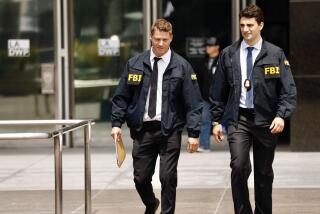Jurors See Deposition by Former PR Exec
- Share via
Although his lawyers have yet to say whether Douglas Dowie will testify, jurors in the former public relations executive’s trial on charges of overbilling the city heard from him Friday when prosecutors played a videotaped deposition in which he discussed how he ran Fleishman-Hillard’s Los Angeles office.
Dowie and a deputy, John Stodder, are accused of conspiring to falsify billings to the city Department of Water and Power and other city and private agencies on behalf of the St. Louis public relations giant.
Fleishman-Hillard has repaid the city about $6 million for billed work it acknowledged could not be verified.
With the videotaped deposition from a civil suit Dowie filed over his firing from Fleishman-Hillard, prosecutors sought to show that the executive was closely involved in the office’s financial matters.
Dowie’s defense attorneys have repeatedly suggested he was distant from day-to-day administration of the office, leaving financial matters -- and the crucial decisions on how to bill -- mostly to subordinates.
This characterization cut against Dowie’s reputation as a tough, no-nonsense former Marine who ran a tight office, tolerating little or no dissent.
In the civil deposition -- unusual evidence in a criminal case -- Dowie said he was intimately familiar with revenue projections, collections and shortfalls for the many public and private contracts the Los Angeles Fleishman office handled in its heyday.
Assistant U.S. Atty. Adam Kamenstein put on a multimedia show in federal court Friday, interspersing clips of Dowie speaking with excerpts from some of the 1.2 million e-mails seized in the two-year investigation.
The e-mails included one from June 6, 2003, in which Dowie asked Stodder, “How much could we pad [the DWP account] with ambiguous billings?”
In another exchange from January 2003, Stodder advised Dowie that his request to “add some bucks” to DWP billings would attract notice and “seems to be more than the market could bear.”
“How much will it bear?” Dowie responded.
When Stodder advises, via e-mail, that a Fleishman executive “thinks she can slip through another 15K without incurring too much scrutiny,” Dowie responds: “OK, lets do it.”
Dowie and Stodder have pleaded not guilty in the case.
The overbilling prosecution emerged during a federal “pay to play” investigation probing possible horse-trading of city contracts for campaign contributions, and has featured testimony from former top aides to mayors Tom Bradley, Richard Riordan and James Hahn.
More to Read
Sign up for Essential California
The most important California stories and recommendations in your inbox every morning.
You may occasionally receive promotional content from the Los Angeles Times.













